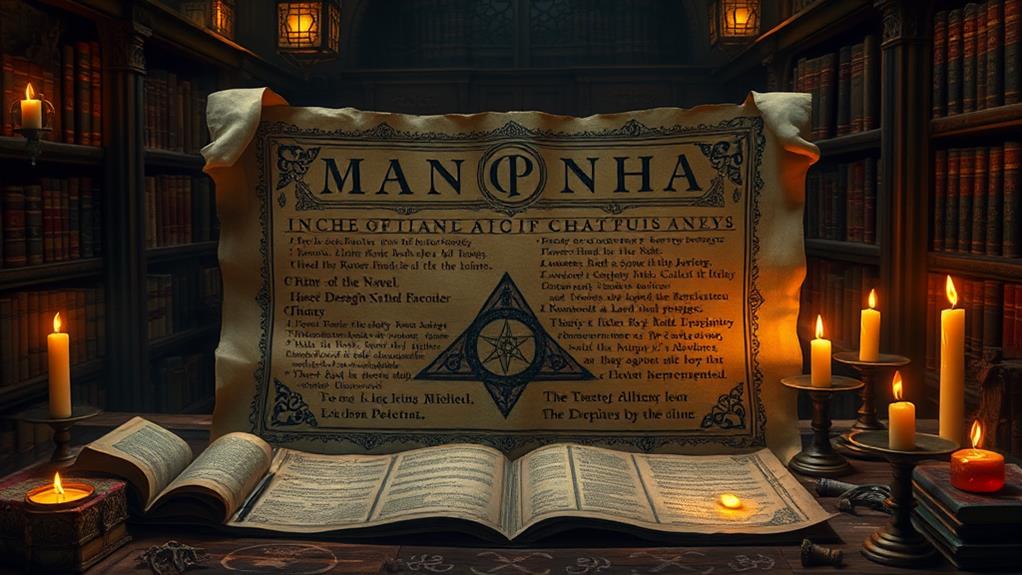
Tracing the evolution of magical spells, you'll see that it spans from ancient incantations inscribed on clay tablets to modern digital spellbooks. Ancient Egyptians and Mesopotamians crafted charms for protection and health, while medieval Europeans consulted grimoires for summoning spirits. The Renaissance brought a blend of alchemy and astrology, transforming spellcasting methods. Industrial-era spells adapted to machinery and efficiency needs. Today, magic incorporates scientific advancements and ethical considerations, with digital tools aiding spellcasters. Each era reflects society's shifting priorities and understanding. Stick around to uncover more about how this fascinating practice continues to grow and adapt.
Ancient Spellcraft Origins
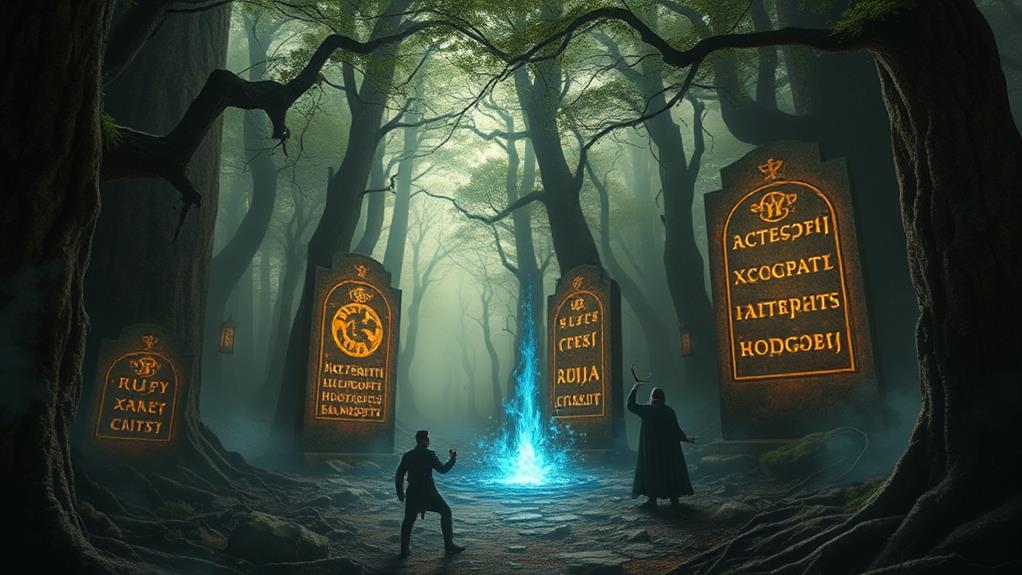
The origins of ancient spellcraft are as enigmatic as they are enthralling. When you examine in-depth into the history of magical spells, you're stepping into a world filled with mystery and wonder. Ancient cultures, from the Egyptians to the Mesopotamians, have left behind cryptic records of their mystical practices. They believed that words had inherent power, capable of bending reality to their will.
Imagine yourself in the ancient world, where scribes meticulously inscribed incantations on clay tablets or papyrus scrolls. These early spellcasters didn't rely on elaborate rituals; their emphasis was on the potency of words and symbols. You'd find that these spells were often intertwined with their daily lives, addressing everything from health and protection to fertility and prosperity.
As you explore deeper, you'll discover that these ancient practitioners viewed spellcraft not merely as superstition but as a sophisticated system of knowledge. They considered it a science, blending elements of religion, astronomy, and natural philosophy. By studying these ancient texts, you can gain a glimpse into their worldview — how they perceived the cosmos and their place within it. This foundational understanding is vital for appreciating the evolution of magical spells throughout history.
Early Enchantments and Charms
Stepping from the ancient origins of spellcraft, you'll find yourself amidst the fascinating domain of early enchantments and charms. These early magical practices were deeply rooted in the daily lives of ancient cultures, serving both practical and spiritual purposes. In ancient Egypt, for instance, charms were used to protect against evil spirits and to guarantee safe passage to the afterlife. You'd find amulets inscribed with hieroglyphs and powerful symbols, believed to hold protective magic.
In Mesopotamia, practitioners crafted incantations to ward off diseases and misfortune. Clay tablets inscribed with cuneiform script contained spells intended to heal the sick or bring good fortune. Similarly, in ancient Greece, you might encounter the use of binding spells, known as "katadesmoi," which were often inscribed on lead tablets and buried to invoke the aid of chthonic deities.
In these early societies, spells and charms weren't merely mystical; they were woven into the fabric of daily life. Whether seeking protection, health, or prosperity, people turned to these enchantments with a blend of faith and hope. By understanding these early practices, you gain insight into how magic began to shape human culture and belief systems.
Medieval Magical Practices
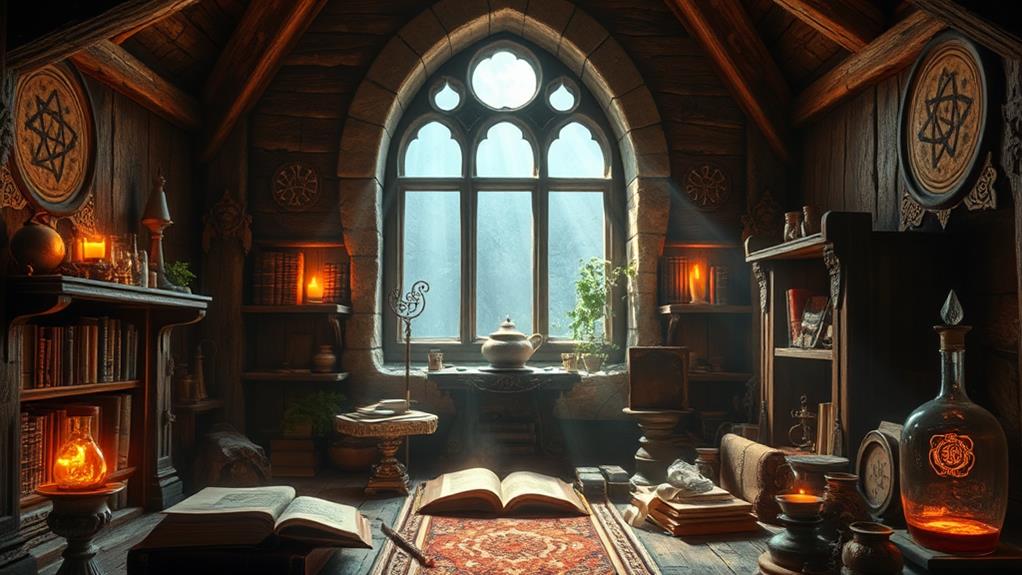
Exploring medieval magical practices offers a glimpse into a world where magic was both revered and feared. You'd find that during this era, magic permeated daily life, entwining with religion, medicine, and even politics. People sought out wise women, alchemists, and cunning folk, believing they could heal ailments, predict the future, and influence events.
In medieval Europe, grimoires—books of spells—were treasured possessions. These texts, like the "Key of Solomon," contained detailed instructions for summoning spirits, crafting talismans, and casting protective spells. You'd see that rituals often involved complex symbols, sacred geometry, and specific incantations spoken in Latin or other ancient languages.
However, practicing magic wasn't without risks. Accusations of witchcraft could lead to severe punishment or even execution. To avoid persecution, many practitioners disguised their spells as religious rites or folk remedies. Herbal concoctions, amulets, and charms were common, blending seamlessly into everyday life.
You'd also notice that magic wasn't just for the marginalized. Nobles and royalty often employed astrologers and magicians to gain insights and secure their power. This blending of the mystical with the mundane reveals just how deeply magic was woven into medieval society.
Renaissance Spell Innovations
During the Renaissance, a period of profound transformation, magical practices evolved dramatically. You'd find that this era birthed a fusion of ancient wisdom and newfound humanistic ideals. Magicians and scholars alike began integrating classical texts with contemporary knowledge, leading to innovative spellcasting techniques. Renaissance magicians didn't just chant incantations; they studied the cosmos, nature, and human psychology to enhance their craft.
Some key innovations from this period:
- Astrological Integration: Spells were timed according to astrological alignments, adding a celestial dimension to magical practices.
- Herbal Compendiums: Detailed herbals were compiled, providing exhaustive guides on the magical properties of plants.
- Symbolic Language: The use of complex symbols and sigils became more prevalent, believed to channel specific energies.
- Ritual Complexity: Rituals became more elaborate, incorporating music, art, and theater to elevate the spell's potency.
- Written Grimoires: The creation of detailed spellbooks, or grimoires, became widespread, preserving knowledge for future generations.
This period marked a shift from purely mystical practices to a more structured and scholarly approach. You'd be amazed at how these innovations laid the groundwork for modern magical practices.
The Age of Alchemy
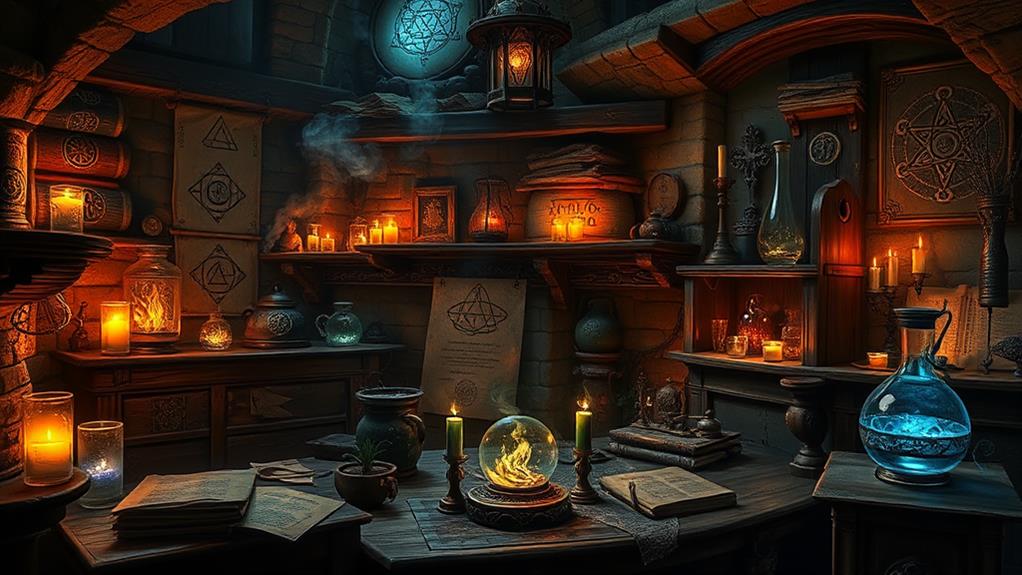
As Renaissance spell innovations laid the foundation for structured magical practices, the Age of Alchemy emerged, pushing the boundaries of mystical and scientific exploration even further. You'd find alchemy blending the mystical with the empirical, aiming to transform base metals into gold and discover the elusive Philosopher's Stone. This period wasn't just about material transformation; it was a quest for spiritual enlightenment and the mastery of nature's secrets.
In your journey through alchemical texts, you'd encounter figures like Paracelsus, who revolutionized the medicinal use of minerals and introduced the idea that the human body is a microcosm of the universe. Alchemists believed that through understanding the natural world, they could tap into hidden powers and achieve ultimate wisdom.
You'd also notice the intricate symbols and coded language alchemists used to protect their knowledge. These arcane scripts weren't merely for secrecy; they reflected the belief that true understanding required both intellectual and spiritual enlightenment. Alchemy's influence extended beyond the laboratory, shaping philosophies and laying the groundwork for modern chemistry. At its core, the Age of Alchemy was a pivotal chapter where magic and early science converged, each enriching the other in profound ways.
Industrial Era Incantations
The Industrial Era saw a significant shift in magical practices, with incantations evolving to address the rapidly changing technological landscape. As factories and machines became integral to daily life, so too did the need for spells that could keep up with this new pace. You'd find that magic users began to focus on efficiency and practicality, crafting spells that could aid in industrial production and machinery maintenance.
To grab your attention, here are some key elements of Industrial Era incantations:
- Mechanomancy: Spells designed specifically to control and repair machinery.
- Efficiency Charms: Incantations that boosted the productivity of factories and reduced waste.
- Safety Enchantments: Magic to protect workers from industrial accidents, which were all too common.
- Energy Manipulation: Spells to harness and redirect energy sources, making steam engines and other machinery more effective.
- Metal Transmutation: Adaptation of alchemical principles to transform and strengthen industrial materials.
Modern Spell Development
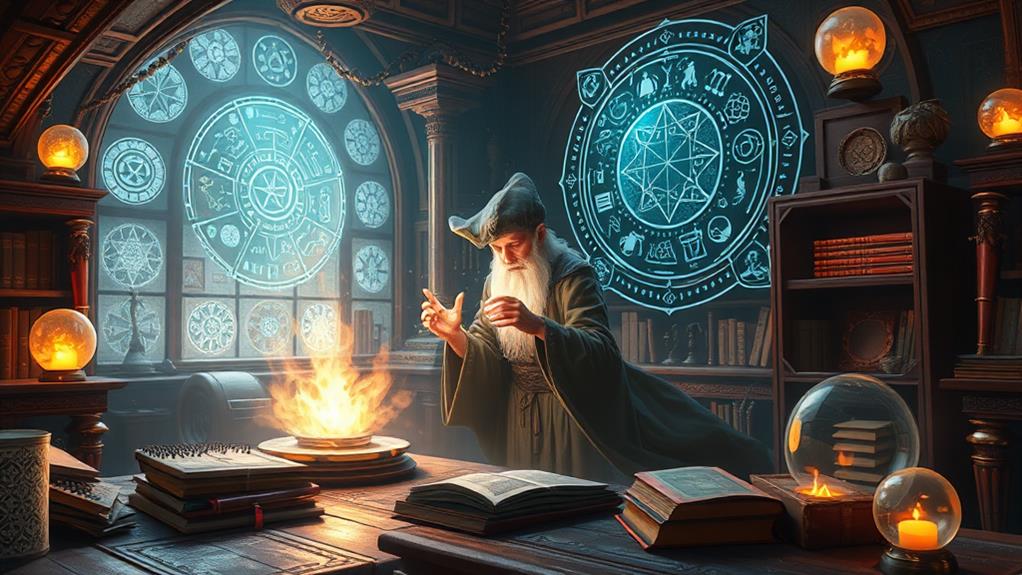
Building upon the innovative spirit of the Industrial Era, modern spell development has entered a new phase of sophistication and adaptability. You'll find that today's spells are more versatile, incorporating elements from various scientific advancements and cultural practices. Modern spellcasters prioritize customization, allowing you to tailor spells to specific needs and contexts.
One of the key aspects of modern spell development is the use of technology. You can now blend traditional spell components with digital tools, making spellcasting more accessible and efficient. For example, spellbooks can be stored on digital devices, and apps can help you track lunar phases or ingredient lists. This integration enhances precision and reduces the margin for error.
Another critical advancement is the ethical considerations in spellcraft. Modern spells often come with guidelines to safeguard they're used responsibly. You're encouraged to weigh the environmental impact and the well-being of others when casting spells. This shift reflects a broader societal move towards sustainability and ethical practices.
Contemporary Spellcasting Trends
In today's magical landscape, contemporary spellcasting trends embrace a fusion of tradition and innovation. You're likely to see spellcasters blending ancient rituals with modern technology, creating a dynamic and evolving practice. This blend guarantees that magic remains relevant and effective in addressing today's unique challenges.
Modern spellcasters often incorporate elements that were unheard of in ancient times.
- Digital Spellbooks: Practitioners use apps and online databases to store and share spells, making it easier to access and collaborate.
- Eco-friendly Ingredients: There's a growing emphasis on using sustainable and ethically-sourced materials in spellcasting.
- Personalization: Spells are often customized to fit the individual's needs and circumstances, making them more effective and meaningful.
- Interdisciplinary Approaches: Combining magic with psychology, holistic health, and even quantum physics to enhance spell potency.
- Virtual Covens: Online communities and virtual gatherings allow spellcasters to connect and perform rituals together, regardless of physical location.
These trends reflect a broader desire to keep magical practices relevant and adaptable in a rapidly changing world. By integrating new methods and tools, you're able to maintain the essence of traditional magic while opening up new possibilities for spellcasting.
Future of Magical Spells
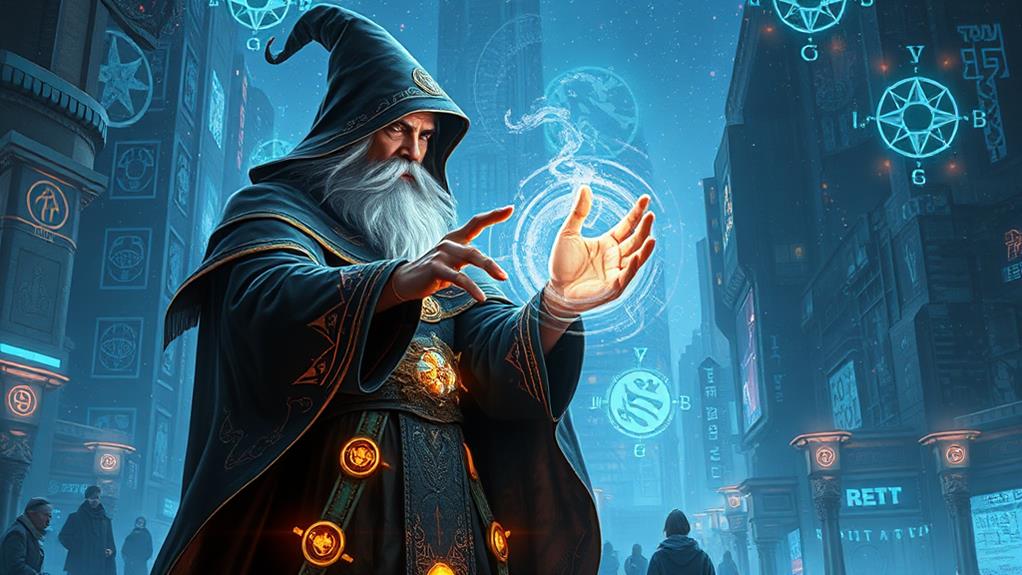
Looking ahead, the future of magical spells promises to be a thrilling evolution of ancient practices. You'll see a fusion of tradition and innovation, where spellcasters blend old wisdom with modern technology. Imagine casting spells with augmented reality (AR) apps or using voice commands to invoke ancient incantations. The accessibility of digital grimoires will democratize knowledge, making spellcasting less elitist and more inclusive.
You'll likely witness an increase in collaborative spellcasting. With social media and online communities, practitioners from around the globe can connect, share, and refine their techniques. This collective intelligence will accelerate the development of more effective and diverse spells.
Sustainability will become a key focus. Future spells may incorporate eco-friendly materials and energies, aligning magical practices with environmental consciousness. You’ll find spells that harness renewable energy sources or utilize biodegradable components. Practitioners will increasingly blend elemental magic and nature’s forces, creating spells that not only promote personal well-being but also protect the planet. These innovative practices will emphasize the interconnectedness of all living things, encouraging a harmonious relationship with the environment. As a result, future spellcasters will seek to deepen their understanding of ecological systems, ensuring that their magical endeavors contribute to a sustainable and balanced world.
Moreover, the ethical considerations of spellcasting will gain prominence. As society becomes more aware of the consequences of actions, you'll see spellcasters advocating for responsible and consensual use of magic. This shift will guarantee that magic evolves in a way that respects both people and nature.
In essence, the future of magical spells is an exciting blend of ancient tradition and forward-thinking innovation.
At a Glance
Just like a river flowing through time, magical spells have evolved, adapting to each era's unique challenges and advancements. You've journeyed from ancient incantations to contemporary spellcasting, witnessing the transformation of mystical practices. As you look to the future, remember that the essence of magic is ever-changing, influenced by the world around us. Embrace the rich history and innovative spirit of spellcraft as you continue to explore and shape the magical arts. From ancient scrolls to modern grimoires, the diversity of magical spells for every wizard reflects the boundless creativity and resilience of the magical community. Each incantation, no matter how simple or complex, carries the legacy of those who shaped the craft before us, serving as a bridge between tradition and innovation. As you delve deeper into the mysteries of the mystical realm, may you find inspiration to forge your own path while honoring the timeless art of spellcasting.






